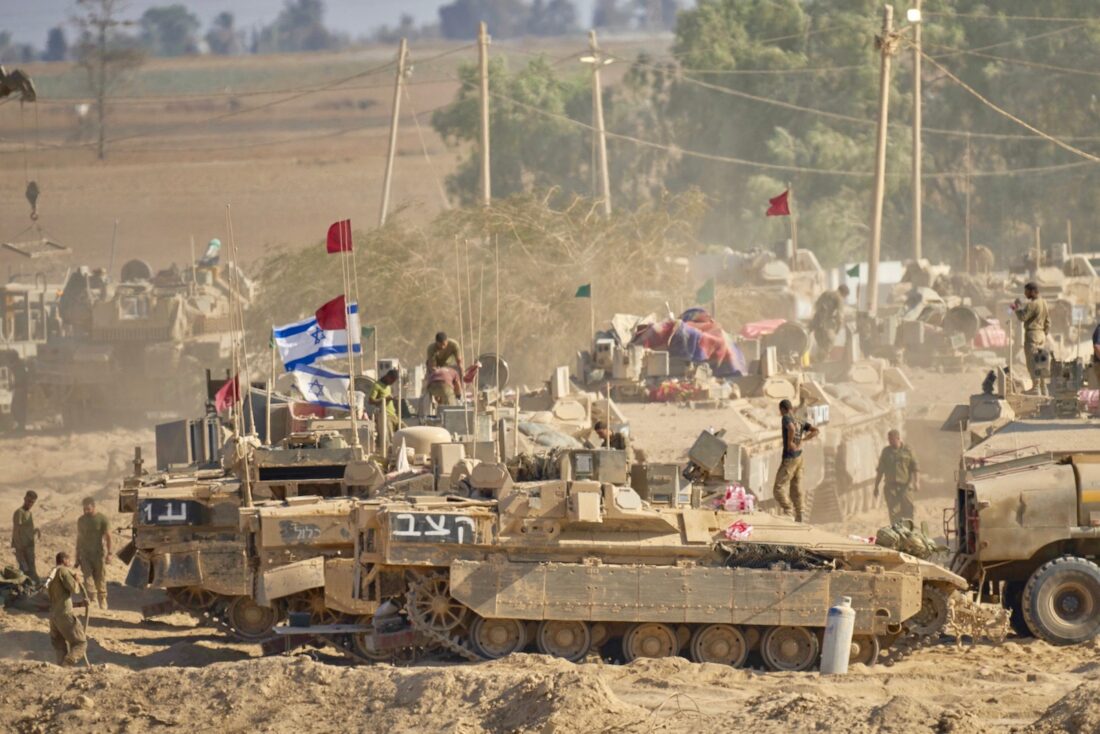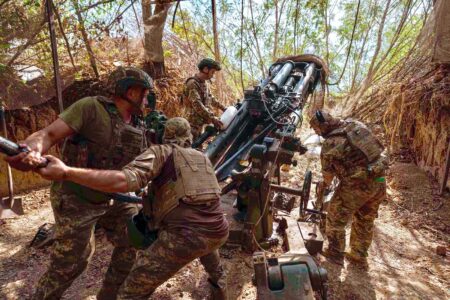Worries rise for civilians: Israel plans Gaza City takeover to pressure Hamas
Israel plans Gaza City takeover to pressure Hamas
- Israeli soldiers are seen near the Gaza Strip border in southern Israel, Wednesday, Aug. 6, 2025. (AP Photo/Ohad Zwigenberg)
- German Chancellor Friedrich Merz attends a cabinet meeting at the chancellery in Berlin, Germany, Wednesday, Aug. 6, 2025, (AP Photo/Ebrahim Noroozi)

Israeli soldiers are seen near the Gaza Strip border in southern Israel, Wednesday, Aug. 6, 2025. (AP Photo/Ohad Zwigenberg)
JERUSALEM (AP) — Israel said Friday it will intensify its 22-month war with Hamas by taking over Gaza City, drawing a dismissal from the militant group and renewed international calls to end the conflict, while stirring fears for Palestinian civilians and Israeli hostages still held in Gaza.
Israel’s air and ground war has killed tens of thousands of people in Gaza, displaced most of the population, destroyed vast areas and pushed the territory toward famine. The timing of another major ground operation is unclear. It will likely require mobilizing thousands of troops and forcibly evacuating civilians, almost certainly exacerbating the humanitarian catastrophe.
An official familiar with the plans to take over Gaza City said the operation would be “gradual” and that there is no start date. The official spoke on condition of anonymity to discuss sensitive matters.
Mediators from Egypt and Qatar are working on a new framework that will include the release of all hostages — dead and alive — in one go in return for an end of the war in Gaza and the withdrawal of Israeli forces from the strip, two Arab officials told The Associated Press.
Before Israel’s Security Cabinet approved the plan to take over Gaza City, Prime Minister Benjamin Netanyahu had outlined more sweeping plans Thursday in an interview with Fox News, saying Israel planned to take control of all of Gaza. Israel already controls around three-quarters of the territory.

German Chancellor Friedrich Merz attends a cabinet meeting at the chancellery in Berlin, Germany, Wednesday, Aug. 6, 2025, (AP Photo/Ebrahim Noroozi)
Hamas rejected Israel’s plans. “Expanding of aggression against our Palestinian people will not be a walk in the park,” the group said in a statement.
Netanyahu had signaled
plans for even broader war
International powers, including Israeli allies, have stepped up criticism of the war amid mounting shock over media reports showing starvation.
Germany said Friday it would not authorize the export of military equipment that could be used in Gaza until further notice.
Tensions could rise further if Netanyahu follows through on the more sweeping plans to take control of the entire territory, two decades after Israel’s unilateral withdrawal.
Asked in the interview with Fox News ahead of the Security Cabinet meeting if Israel would “take control of all of Gaza,” Netanyahu replied: “We intend to, in order to assure our security, remove Hamas there.” He added that Israel did not intend to “keep it.”
Israel’s new plan may be aimed in part at pressuring Hamas to accept a ceasefire on Israel’s terms.
It may also reflect the reservations of Israel’s military chief of staff, Lt. Gen. Eyal Zamir, who reportedly warned that expanding operations would endanger the remaining 20 or so living hostages held by Hamas and further strain Israel’s army after nearly two years of regional wars.
The military “will prepare to take control of Gaza City while providing humanitarian aid to the civilian population outside the combat zones,” Netanyahu’s office said in a statement after the Security Cabinet meeting.
Amir Avivi, a retired brigadier general and chairman of Israel’s Defense and Security Forum, estimated it would take less than three months to mobilize some 30,000 troops, evacuate Palestinian civilians and take over Gaza City.
Hamas-led militants triggered the war when they stormed into Israel on Oct. 7, 2023, killing around 1,200 people and abducting 251 people. Most of the hostages have been released in ceasefires or other deals but 50 remain inside Gaza. Israel believes around 20 of them to be alive.
Israel’s retaliatory campaign has killed over 61,000 Palestinians, according to Gaza’s Health Ministry, which does not say how many were fighters or civilians. The ministry is part of the Hamas-run government and staffed by medical professionals.
The United Nations and independent experts view the ministry’s figures as the most reliable estimate of casualties. Israel has disputed them without offering a toll of its own.
Mediators try again to end the war
The efforts for a new ceasefire have the backing of major Arab Gulf monarchies, according to two officials who spoke anonymously due to the sensitivity of the discussions. One is involved directly in the deliberations and the second was briefed on the efforts. The monarchies are concerned about further regional destabilization if Israel fully reoccupies Gaza, the officials said.
The yet-to-be finalized framework aims to address the contentious issue of what to do with Hamas’ weapons, with Israel seeking full disarmament and Hamas refusing. The official directly involved in the efforts said discussions are underway about “freezing arms,” which may involve Hamas retaining but not using its weapons. It also calls for the group to relinquish power in the strip.
A Palestinian-Arab committee would run Gaza and oversee the reconstruction efforts until the establishment of a Palestinian administration with a new police force, trained by two U.S. allies in the Middle East, to take over the strip, the official said. It is unclear what role the Western-backed Palestinian Authority would play.
The second official said the U.S. administration has been briefed on the broad lines of the framework.
A senior Hamas official, speaking on condition of anonymity because he wasn’t authorized to brief the media, said the group has yet to receive details on the latest efforts to revive ceasefire talks.
AP reached out to the governments in Qatar, Egypt and Israel as well as the White House for comment.
U.S. envoy Steve Witkoff told hostage families during his recent visit that Israel was shifting its approach to pursue a comprehensive “all-or-nothing” deal aimed at ending the war and securing the release of hostages, a person who attended the meeting told the AP, speaking on the condition of anonymity as they were not authorized to speak about the private meeting.
‘There is nothing here to occupy’
Israel has repeatedly bombarded Gaza City and carried out numerous raids there, only to return to neighborhoods again and again as militants regrouped. Today, it is one of the few areas in Gaza that hasn’t been turned into an Israeli buffer zone or placed under evacuation orders.
Umm Youssef from Gaza City said she had left the city for over 16 months before returning to her home.
‘The area is all rubble. Rubble is an overstatement, it is a sandpile. There is nothing here to occupy. There is no life here,” she said.
A major ground operation there could displace tens of thousands of people and further disrupt efforts to deliver food to the hunger-stricken territory.
It’s unclear how many people are still in Gaza City, the territory’s largest before the war. Hundreds of thousands fled under evacuation orders in the opening weeks of the conflict, but many returned during a ceasefire at the start of this year.
Germany halts military exports to Israel for use in Gaza amid outcry over Netanyahu plan
BERLIN (AP) — Germany won’t authorize any exports of military equipment to Israel that could be used in Gaza “until further notice,” Chancellor Friedrich Merz said Friday, in a strikingly quick response by one of Israel’s strongest international backers to a decision by Prime Minister Benjamin Netanyahu’s Cabinet to take over Gaza City.
The move by Germany, which has previously stopped short of tougher lines against Israel’s government taken by some of its European Union allies, appeared likely to further isolate Israel in the wake of the military takeover plan that has been decried by the United Nations, aid and human rights groups, and supporters of Israeli hostages still held in Gaza, among others.
Germany, along with the United States and Italy, is among the top foreign suppliers of equipment used by Israel’s military. The pause adds to action taken by European countries — including economic, military and diplomatic measures — against Israel in recent months out of concern over its government’s conduct in the nearly two-year war in Gaza.
Merz said in a statement that Israel “has the right to defend itself against Hamas’ terror” and that the release of Israeli hostages and purposeful negotiations toward a ceasefire are “our top priority.” He said that Hamas mustn’t have a role in the future of Gaza.
“The even harsher military action by the Israeli army in the Gaza Strip, approved by the Israeli Cabinet last night, makes it increasingly difficult for the German government to see how these goals will be achieved,” he said. “Under these circumstances, the German government will not authorize any exports of military equipment that could be used in the Gaza Strip until further notice.”
It wasn’t immediately clear which military equipment from Germany would be affected. Asked by The Associated Press for details about which military hardware would be affected, the German government declined to comment.
Germany has led efforts among the EU’s 27 member nations to block collective criticism of or efforts to stop Israel’s blockade of Gaza and military campaign in the coastal enclave.
Alongside Hungary and the Czech Republic, Germany has argued against calls from Spain, Ireland and the Netherlands to scrap a bilateral agreement with Israel, sanction settlers, and enact an arms embargo.
Weight of responsibility
The German government remains deeply concerned about the suffering of civilians in Gaza, Merz said.
“With the planned offensive, the Israeli government bears even greater responsibility than before for providing for their needs,” he said.
Merz called on Israel to allow comprehensive access for aid deliveries — including for U.N. organizations and other nongovernmental organizations — and said that Israel “must continue to comprehensively and sustainably address the humanitarian situation in Gaza.”
The move has particular weight because Germany has been seen as one of Israel’s strongest supporters — arguably surpassed only by the United States. Germany has maintained a strongly pro-Israel stance for decades largely because of its historical responsibility for the Holocaust, which has shaped its postwar foreign policy around ensuring Israel’s security and combating antisemitism.
Merz’s government didn’t join announcements by French President Emmanuel Macron and British Prime Minister Keir Starmer that their governments plan to formally recognize a Palestinian state in September.
The reluctance so far of Germany, the EU’s biggest economic power, to take a tougher line on the actions of Netanyahu’s government clouded the prospects that international pressure might have an impact on Israel’s decisions.
Israel’s air and ground war has already killed tens of thousands of people in Gaza, displaced most of the population, destroyed vast areas and pushed the territory toward famine. The campaign was triggered when Hamas-led militants stormed into Israel on Oct. 7, 2023, killing around 1,200 people and abducting 251 people.
Merz also called on Israel’s government “not to take any further steps toward annexing the West Bank.”
A ‘big deal’ but not decisive
According to the Stockholm International Peace Research Institute, or SIPRI, last year, Germany was the No. 2 supplier of arms to Israel after the United States.
German companies provide 30% of Israel’s defense imports, mostly naval armaments, according to data analyzed by Zain Hussain, an arms transfers researcher at SIPRI. He suggested the pullback by Germany — which has deep political support for and strong defense ties with Israel — would be temporary.
“This is going to be a limited measure,” Hussain said. “Germany has been committed to providing Israel with arms, especially with ships.”
“It is a big deal I suppose in the sense that Germany — which has been committed to Israel’s security and has stood firmly with it — is openly admitting that it is uncomfortable with Israel’s actions and limiting some arms transfers, and for Germany this is a huge deal,” he said. “However, I don’t think this alone will stop Israel’s operations in Gaza, and Israel still has the USA as a committed arms supplier.”
German-made engines can be fitted in Israeli Merkava tanks and Namer armored personnel carriers, which are actively deployed in Gaza. Sa’ar corvettes — small warships festooned with sophisticated radar equipment and cannons — from Germany have been used to shell targets in Gaza during the war, Hussain said.
The German news agency DPA, citing figures from the Germany Economy Ministry, in early June reported that the government had approved 485 million euros (about $565 million) worth of arms exports to Israel between Oct. 7, 2023 and May 13 this year.
Other European officials express concern
In a post on X, European Commissioner Ursula von der Leyen said Israel’s extension of military operations in Gaza “must be reconsidered,” in her strongest criticism yet during the war. She also made yet another call for Israel to let in more aid.
The foreign ministers of the Netherlands and Denmark called Israel’s decision to intensify the operation “wrong” and expressed concerns for civilians and the humanitarian situation in Gaza. Czech Foreign Minister Jan Lipavský told the CTK news agency the his country considers the plan by Israel to take over Gaza City “a risky step.”
Last week, even before the Gaza City takeover plan, Slovenia announced that it would ban the import, export and transit of all weapons to and from Israel in response to the country’s actions in Gaza — saying it was the first EU member country to do so.
Last month, two dozen mostly European countries condemned Israel’s restrictions on aid shipments into Gaza and the killings of hundreds of Palestinians trying to reach food.
Last year, the U.K. suspended exports of some weapons to Israel over concerns they could be used to break international law, but it was a move with limited military impact. The decision related to about 30 of 350 existing export licenses for equipment that could be used in Gaza, including parts for military planes, helicopters and drones.
Outrage over Israel’s actions in Gaza has grown in Europe as images of suffering Palestinians have driven protests in London, Berlin, Brussels and other capitals. More recently, almost-daily killings of Palestinians while seeking aid have tested the EU’s friendly relationship with Israel like never before.
The Israeli decision, taken after a late-night meeting of top officials, came despite mounting international calls to end the war and protests by many in Israel who fear for the remaining hostages held by Hamas. Tens of thousands of Palestinians are bracing to once again be forced from their homes, while families of the hostages fear their loved ones won’t return.
Most of the hostages have been released in ceasefires or other deals but 50 remain inside Gaza. Israel believes around 20 of them to be alive.
The timing of another major Israeli ground operation remains unclear since it will likely hinge on mobilizing thousands of troops and forcibly evacuating civilians, almost certainly exacerbating the humanitarian catastrophe.







